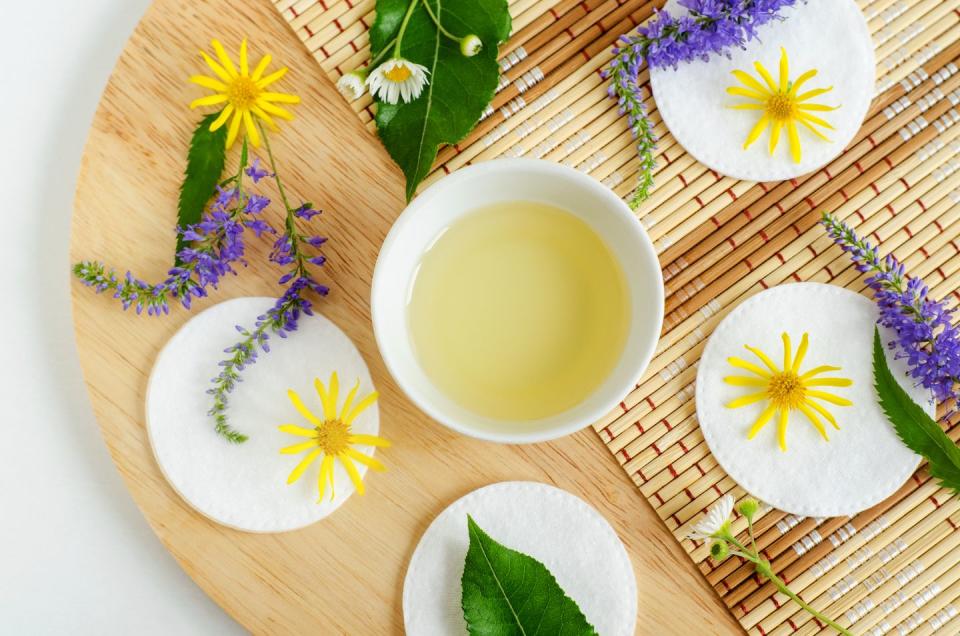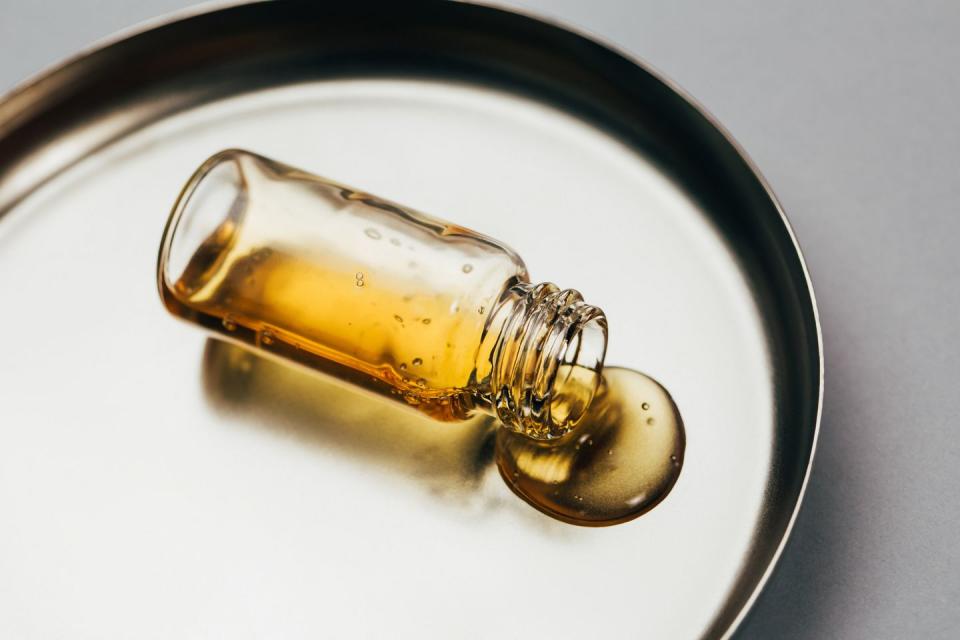11 castor oil science-backed health benefits and uses

Castor oil is a vegetable oil produced from pressing the seeds of the castor bean plant. Traditionally manufactured in Western India but now common across China and Brazil, castor oil has been used for many years in cosmetic products such as soap, thanks to its lubrication properties. But there's more to castor oil than cosmetics; these days increasing research points to a number of proven health benefits, including castor oil's wound healing and antiviral potential.
But what exactly is castor oil and is it safe to slather on your skin? We spoke to the experts to get the lowdown on castor oil benefits, uses and potential side-effects:
What is castor oil?
Castor oil is a vegetable oil produced by pressing the seeds of the plant, Ricinus communis, or simply the castor bean plant.
'Ricinus plants are cultivated as the source for castor oil, which is used in animal feed, medical products, hygiene products, cosmetics, paints, dyes, and many other uses,' says Dr Deborah Lee of Dr Fox Online Pharmacy.
'The seeds of the Ricinus plant contain a deadly poison – ricin – which must never be chewed or eaten raw,' she continues. 'However, castor oil itself is safe to use, as the heat involved in processing castor oil destroys ricin.'
Castor oil is a thick oil, which is either colourless or pale yellow. 'It has a distinctive smell, and has an unpleasant taste, like Vaseline,' Dr Lee adds. 'The main component of castor oil is ricinoleic acid - a monounsaturated fatty acid.'

11 castor oil health benefits
Castor oil comes with a number of science-backed health benefits and uses, according to the experts. These include the following:
1. Castor oil can help treat constipation
Feeling backed up? A few spoonfuls of castor oil could be just the ticket thanks to its laxative properties.
'Castor oil is an effective laxative for short-term relief of constipation,' says Dr Ana, aesthetic doctor at Kat & Co.
'Many people will have heard of the laxative properties of castor oil,' agrees Dr Lee. 'Once ingested, castor oil is broken down by intestinal lipase enzymes, which activates EP3 and EP4 smooth muscle cell receptors, and stimulates intestinal transport.'
2. Castor oil is good for dry skin
For dry skin sufferers, you can rub castor oil directly onto your skin to enjoy its natural moisturising benefits.
'Castor oil has many hydrating properties for the skin due to its high fatty acid content,' says Dr Ana.
3. Castor oil can help treat acne
Battling acne? According to Dr Ana, castor oil has anti-inflammatory properties which can help dampen the inflammatory process in acne breakouts and sensitive skin.
'Castor oil may be useful to treat acne because of its antimicrobial effects on skin bacteria,' agrees Dr Lee. 'It also has a high triglyceride content, which is useful for moisturising the skin and helps it retain water. It can also help unclog blocked pores and assist the skin by helping to keep it well hydrated.'
'Apply castor oil gently, directly to the skin using a cotton pad,' Dr Lee instructs. 'Although it can be used in its concentrated form, it can also be diluted by mixing it with other oils in a ratio of 1:1.'
4. Castor oil is good for your hair
If your tresses need a pick me up, castor oil is also said to promote healthy hair growth, although the evidence is limited. However, castor oil can be used as a hair conditioner.
'It helps condition the skin of the scalp and improves the lustre and gloss of the hair,' says Dr Lee. 'Hair specialists recommend castor oil as a way of nourishing hair and improving hair quality.'
5. Castor oil is good for feet
It's a little known fact that castor oil can be used to treat athlete’s foot. 'It contains undecylenic acid, which has been found to an effective remedy for treating the fungal infection Trichophyton rubrum – the main cause of athlete’s foot,' explains Dr Lee.
Meanwhile, 'Castor oil can also help treat dry, cracked heels,' she says, 'because it is an excellent moisturiser and also helps the skin to retain water.'

6. Castor oil can help heal wounds
Studies have found that castor oil can speed up wound healing. 'Castor oil can help support the wound healing process,' says Dr Ana.
'In laboratory studies involving rats, ricinoleic acid - the main ingredient of castor oil - has been demonstrated to stimulate wound healing in chronic wounds such as skin ulcers,' adds Dr Lee.
Consult a medical professional before slathering oil onto broken skin as you could easily exacerbate it.
7. Castor oil could help with cancer treatment
While research is still limited, there's encouraging evidence to suggest that castor oil could help with some types of cancer treatment.
'Laboratory studies have shown castor oil may have a positive effect against some types of cancer cells, such as colonic cancer,' says Dr Lee.
8. Castor oil is used as an insect repellant
Waging a war against summer midges and mosquito bites? 'Castor oil has shown a significant effect as an insecticide against various beetles and weevils, such the adzuki bean weevil,' says Dr Lee. 'It has also been used with some success to repel moles.'
Pour the solution into a spray bottle and use it to coat your legs, arms, and other exposed areas in order to repel insects.
9. Castor oil is an anti-inflammatory
Castor oil may have anti-inflammatory properties which makes it useful for treating irritated skin
'In animal studies, topical application of ricinoleic acid (the main ingredient of castor oil) to areas of acute or chronic inflammation produced an anti-inflammatory effect, with markedly less tissue oedema (swelling),' says Dr Lee.
10. Castor oil stimulates immune response
Castor oil may strengthen the immune system by increasing white blood cells and therefore fighting infections.
'Topical application of castor oil to the skin may stimulate T cells and induce a local or a generalised immune response,' says Dr Lee.
11. Castor oil could be a natural painkiller
Research suggests that because of its anti-inflammatory properties, castor oil can be used to help relieve joint pain and menstrual cramps when it is applied to the skin.
Castor oil side-effects
Although castor oil is considered to be safe to use, proceed with caution and always speak to your doctor first, as it can come with side-effects.
'Some of the possible side-effects include diarrhoea, abdominal pain, irregular heart rhythms, muscle cramps and confusion,' says Dr Ana. 'It should be used with caution during limited time periods, and always consult your doctor as necessary.'
Who shouldn't use castor oil?
Some people should avoid castor oil. These include:
People with allergies: 'Be aware that castor oil contain some allergens so make sure to use it with caution, monitor for signs of an allergic reaction and check the label carefully if you have any known allergies,' says Dr Ana.
Pregnant or breastfeeding women: 'Castor oil is not recommended in pregnancy, because although this has not been proven, there is concern that it may cause uterine contractions and premature labour,' says Dr Lee.
Anyone with gastrointestinal disease: 'Avoid if you have a history of GI disease, such as intestinal obstruction, appendicitis, bowel perforations, or inflammatory bowel disease,' says Dr Lee.
⚠️ Always discuss with your pharmacist or doctor before using castor oil, to ensure there are no significant interactions with any of your current medications.
Last updated: 29-03-2021
You Might Also Like


